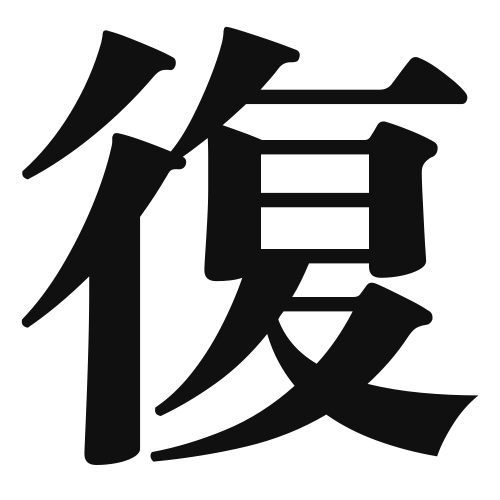1. Overview of Meaning
The kanji “復” (fuku) generally means “to return,” “to restore,” or “to repeat.” It conveys the idea of going back to a previous state or condition.
2. Formation and Radical
Formation of the Kanji: The kanji “復” is a compound character, which means it is formed by combining different elements. It consists of the radical “彳” (to walk) and the phonetic component “複” (fuku), which relates to the idea of doubling or repeating.
Radical: The radical of “復” is “彳,” which often relates to movement or walking, suggesting a return or movement back to a previous point.
3. Examples of Usage
Common Words and Phrases: Some frequently used words that include “復” are “復活” (fukkatsu – revival), “復習” (fukushuu – review), and “復元” (fukugen – restoration).
Example Sentences in Daily Conversation:
- 彼は仕事に復帰しました。(Kare wa shigoto ni fukki shimashita.) – He has returned to work.
- この映画は復讐の物語です。(Kono eiga wa fukushuu no monogatari desu.) – This movie is a story of revenge.
4. Synonyms and Antonyms
Similar Kanji: A similar kanji is “返” (hen), which also means “to return,” but it is more commonly used in the context of returning something to its original owner.
Antonyms: An antonym of “復” is “失” (shitsu), which means “to lose” or “to miss,” indicating a departure from a previous state rather than a return.
5. Cultural and Historical Background
Relation to Japanese Culture: The concept of “復” is significant in Japanese culture, often associated with themes of renewal and restoration, which can be seen in various cultural practices and traditions.
Proverbs and Idioms: One common saying is “復讐は最高の喜び” (Fukushuu wa saikou no yorokobi), which translates to “Revenge is the greatest joy,” reflecting the cultural significance of the idea of returning to a previous state, albeit in a more negative context.
